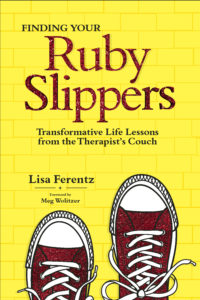Gust Blog Post: What Matters Most Is the Meaning You Attach to Experiences by Lisa Ferentz, author, Finding Your Ruby Slippers
 (Excerpt from Finding Your Ruby Slippers: Transformative Life Lessons from the Therapist’s Couch)
(Excerpt from Finding Your Ruby Slippers: Transformative Life Lessons from the Therapist’s Couch)
Many things have happened throughout your life. Some of those situations have felt “wonderful” and others have felt “terrible.” Like most people you probably believe that life events and personal interactions are either “good” or “bad” and then respond to them accordingly. You might feel delighted, lucky, or grateful when “good” things happen, and angry, scared, cheated, or victimized when “bad” things occur.
But what if these events and experiences were mostly “neutral?” What if the way in which you reacted to them was rooted more in the meaning that you consciously or unconsciously attached to them rather than the experiences themselves? I realize this can initially feel like a radical idea. Surely there must be some life events that by everyone’s standards are just plain “bad” or “tragic” or “wonderful.”
And yet as a therapist I’ve witnessed people reacting in ways that seem to directly contradict how the world would think about and label certain experiences. It’s not uncommon for 10 people to witness or participate in the exact same experience and react in 10 different ways. It has made me realize that it’s not really about the event itself: it’s the meaning you attach to the event that influences the specific ways in which you think, feel, and respond to what has taken place.
Believe it or not this can be good news! This mindset allows you to focus on what you can control about the situation and helps dictate the ways in which life events do and don’t affect you. It’s empowering to know that you have the ability to look at an experience through more than one lens. You get to decide whether or not the situation has defeated you or strengthened you. You decide whether or not to take it personally.
There are people who see a sunny day and “wait for the other shoe to drop,” choosing to believe that rain clouds are probably right around the corner. As a result they stay inside, depriving themselves of sunshine while waiting for the rain to come. And when the rain does come, they experience it as further “proof” that all things eventually get ruined.
Others see the sunshine through a positive lens and don’t even think about the possibility of rain. They choose to savor the warm outdoors and if the clouds do roll in and the raindrops fall they choose to see that as a great opportunity for the flowers to be watered! Same event, yet attaching completely different meanings yields very different emotions and behavioral choices.
Obviously sunshine and rain clouds are a simplistic example. But I’ve seen people attach meaning to deeply traumatic and upsetting events in ways that either paralyze and defeat them or enable them to tap into remarkable resiliency and thrive.
Think about this life lesson of “meaning making” and notice the ways in which you respond to both small and deeply impactful experiences. Ask yourself if anything could shift or change for you if you chose to attach a different meaning to those same experiences. Since you can never undo and often cannot control what has already occurred your power lives in your ability to find meaning that will move you forward, promote self-compassion, and help you to heal.
The longer you live the clearer it becomes that “stuff happens.” The real question and life lesson is, “Now what do you want to do about it?” Know that the meaning you attach to an event will often guide, in subtle and profound ways, what you “do with it” in the short and long term. Having a more conscious awareness about your responses to powerful life events is the key to determining the path that you’ll follow.
When the meaning supports ideas such as the world is out to get you, people can’t be trusted, you’ll never succeed, everyone is selfish, you’ll always be alone, or you’re unlovable, that often leads to a path of re-victimization and intense feelings of helplessness and hopelessness. This in turn creates a shutting down of emotions, isolation and a refusal to reconnect with others, heightened defensiveness, chronic bitterness, and an unwillingness to take risks.
However, there’s a different mindset that you can attach to traumatic events. Changing the meaning can begin to move you in a very different direction. Trauma can inspire a belief that there’s a lesson to learn, confirm the humble reality that some things are not in your control, and promote the idea that when a bad thing happens it doesn’t mean you are bad. These thoughts will then lead to a significant change in behaviors. Social connection, a focus on resiliency, opportunities to act creatively, a move toward forgiveness, and the desire to pay it forward all forge a path that can lead to remarkable growth and positive changes in your life.
 Lisa Ferentz is a clinical social worker and psychotherapist who has been in private practice for over 30 years. She is the founder of The Ferentz Institute and author of the new book, Finding Your Ruby Slippers: Transformative Life Lessons From the Therapist’s Couch. An internationally known speaker, clinician and consultant, Ferentz participates in documentaries, webinars and podcasts related to trauma, self-care and well-being. She is also the author of Treating Self-Destructive Behaviors in Trauma Survivors: A Clinician’s Guide and Letting Go of Self-Destructive Behaviors: A Workbook of Hope and Healing. Connect with Lisa Ferentz on Facebook, at www.lisaferentz.com, and through her column for Psychology Today.
Lisa Ferentz is a clinical social worker and psychotherapist who has been in private practice for over 30 years. She is the founder of The Ferentz Institute and author of the new book, Finding Your Ruby Slippers: Transformative Life Lessons From the Therapist’s Couch. An internationally known speaker, clinician and consultant, Ferentz participates in documentaries, webinars and podcasts related to trauma, self-care and well-being. She is also the author of Treating Self-Destructive Behaviors in Trauma Survivors: A Clinician’s Guide and Letting Go of Self-Destructive Behaviors: A Workbook of Hope and Healing. Connect with Lisa Ferentz on Facebook, at www.lisaferentz.com, and through her column for Psychology Today.















